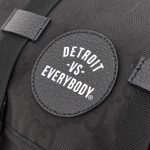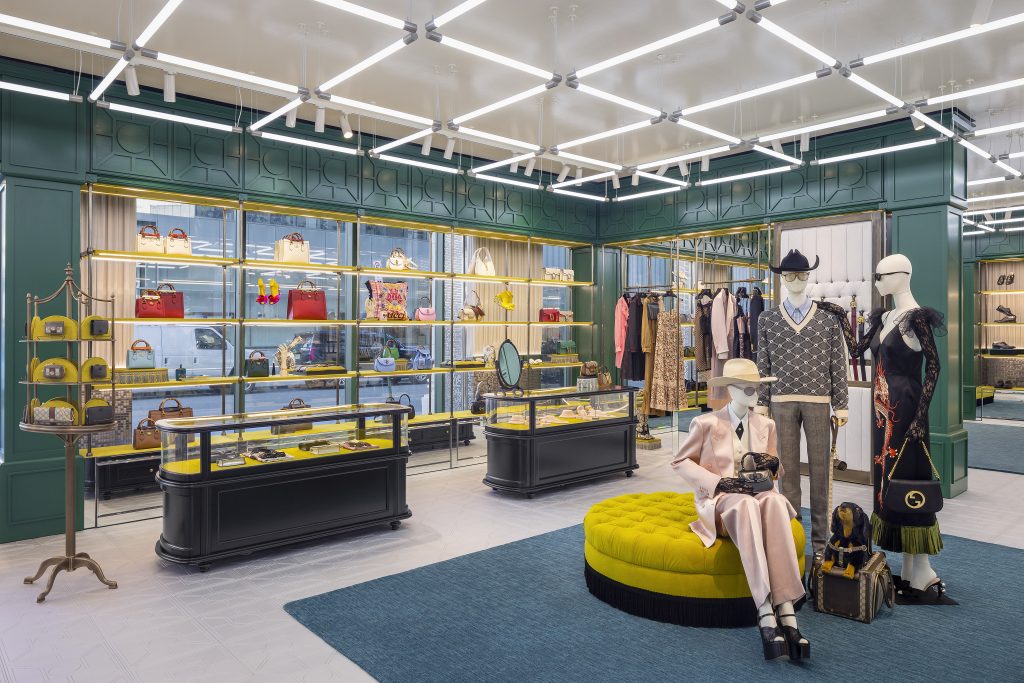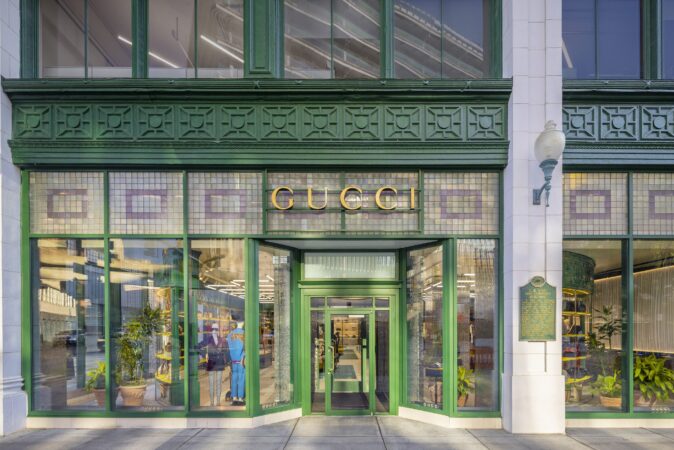The world’s leading luxury brand, recently announced the opening of its new 3,500 foot store located on Library Street, in a newly minted cultural district in downtown Detroit—making it the first international fashion house, and international luxury brand, to lay down a footprint in the eclectic city. It’s not the first time the fashion brand has been the first.
Founded in Italy, in 1921, Gucci is led by now President and CEO Marco Bizzarri and Creative Director Alessandro Michele, who have newly helmed the influential brand that fervently resonates with fashion followers of all ages and demographics. Having recently staged a coveted fashion show on Hollywood’s walk of fame, to breaking down separate men’s and women’s fashion week shows, in the last few years the brand tends to have a more seemingly humanistic take on fashion’s firsts. What may seem an off-kilter approach – collaborating with the creative space in Detroit – has been a priority for the company, and it’s as much about showcasing the Gucci brand of high-end men’s and women’s clothing, jewelry, accessories, and home décor, as it is about helping to minimize the chasms regarding inclusivity, unity, while showcasing stronger representation in the fashion industry. For those in Detroit, style has always been the name of the game, and men’s style and fashion in particular play’s a crucial role in the dynamics within communities and generations.
Gucci is currently establishing programs that are laying the groundwork to ensure more people of color have opportunities in fashion and adjoining creative industries. Helping lead the brand on that mission is Antoine Phillips, who joined Gucci in March of 2019 as its vice president of brand and culture engagement, after years in PR and marketing.
Detroitisit spoke exclusively to Antoine Phillips about Gucci’s presence and plans for synergistic programs in Detroit for producing positive change in a city that can only benefit from it.
DII: Historically, Detroit has been a diverse city exploding with creative innovation and cultural contributions, including those notably to the auto industry and modern music, with Motown. Recently named the only U.S. UNESCO designated City of Design, what are some of the other motivations drawing you here for the Gucci retail store, and the social impact programs you’re helping to spearhead in Detroit. Why Detroit? Why now?
AP: Detroit has been incredibly welcoming over the years to us. Gucci was and continues to be inspired by

ANTOINE PHILLIPS GUCCI VP OF BRAND AND CULTURE ENGAGEMENT
the abundance of creativity and resiliency in Detroit. I felt that incredible vibrancy when I was here in 2019 for an event we hosted at Cass Tech High School, and we’ve continued to keep a close relationship with the school and students there. Gucci has supported several creative endeavors in the city over the years, commissioning Jenn Nkiru’s Black to Techno film in 2019 and launching a capsule collection alongside Tommey Walker, the visionary behind Detroit Vs. Everybody. Tommey has become not only a collaborator but also a friend as we’ve built a community in Detroit.
Detroit is also a focus city for the Gucci Changemakers North America Impact Fund, which pushes for stronger representation in the fashion industry through grants and scholarships. I have made genuine connections with incredibly talented individuals in the city. Now that we have a permanent home in Detroit, we are looking forward to deepening our connections to the city.
DII: Aside from our unapologetic spirit of fashion, confidence to be fashion originators, and the ability to reinvent and revitalize continuously, what are some other similarities between Detroit and Gucci that helped create a vision for your partnership here? Can you elaborate on that vision?
AP: Detroit has given so much to our cultural history across music, the arts, the automotive industry, and more. The city is unlike any other city. Detroit has always been pulsing with creativity—and we are thrilled to be joining the community and will continue to uplift the creative voices here.
DII: Creativity and resulting controversy can become the catalyst for positive, impactful change. As VP of brand and culture engagement at Gucci, tell us about the Changemakers program designed to help make positive, systemic changes within your industry, for future fashion creatives of color. What are its positive effects on the youth and inclusivity and diversity issues in Detroit, as well as the entire fashion industry? Also, what non-profits in Detroit will or have already benefited from the program?
AP: Gucci Changemakers was started in 2019 with Detroit as one of our 12 focus cities. The program provides multi-year grant funding to organizations working to promote social good in diverse communities throughout North America and offers scholarships to students interested in pursuing degrees in fashion and design. Since then, we have awarded 56 scholarships to talented young students and grants to 43 grassroots organizations.
Gucci Changemakers is proud to have supported three local Detroit non-profits, Mosaic, Design Core Detroit, and JOURNi, and granted scholarships to three local students.
To celebrate the third cohort of grantees, which we announced in August, we will participate in the 12th annual Detroit Month of Design with the 2022 Gucci Changemakers Scholars exhibition entitled “Building a Lasting Impact” at MOCAD, on view from September 9 until September 11.
Curated by Kiana Wenzell, co-executive Director of Design Core Detroit, one of the 2020 Gucci Changemakers Impact Fund recipients. The exhibit will highlight the works of the 2022 Gucci Changemakers Scholars and allow us to inspire lasting change through the power of arts and culture.
DII: An important change in Detroit’s fashion culture has been the commitment to environmentally responsible fashion—as seen from influential designers like Tracy Reese and Tommey Walker, of Detroit VS Everybody. Gucci has the same ideology and has developed a partnership with Walker; Gucci VS Everybody 2.0 (GVE2.0). Tell us about that collaboration, and also the sustainable Gucci Off The Grid collection.
AP: The intersection of positive change for people and planet is prominent in our work, so sustainability is

DETROIT VS EVERYBODY 2.0 CUSTOM PATCH
deeply important to Gucci’s present and future. The limited-edition DETROIT VS EVERYBODY collection is built from Gucci’s Off the Grid range. Designed with sustainability in mind, the products are made with recycled, organic, bio-based, and ethically sourced materials, including ECONYL®, regenerated nylon made from nylon offcuts and pre-and post-consumer waste. The collection is a representation of the shared values between Tommey Walker and Gucci to create a positive impact.
DII: The fashion industry today is becoming a mosaic of creative designs, unifying ethos, environmental concerns, and inclusivity and diversity—not simply the concern for next season’s collections. As leaders in this new ideology, how does Gucci, and you — a man of color in a leadership role in the fashion industry—hope to see the next generation of fashion professionals evolving in terms of this more expansive canvas, especially in a city such as Detroit?
AP: I am honored and privileged to manage the Gucci Changemakers Scholars program in my role and am inspired every day by the vision of the young people and non-profits who apply to the program.
We get hundreds of applications each round, which allows us to understand what the next generation of designers and creatives are bringing to the table. The next generation is uniquely qualified for the challenges of the future – they are deeply passionate about sustainability, the environment, and diversity.
Within Detroit, one of our Gucci Changemakers scholars, Miles Richards, attends the College of Creative Studies. I was able to visit the school and see the students’ creativity there is second to none.
Music, art, and culture are all deeply ingrained in Detroit, and it inspires not only me but Gucci to think creatively about how we engage with partners and individuals on the ground in all our work. The store opening and event at the MOCAD are only the beginning of our work in Detroit and I can’t wait to meet more creatives in the city now that we have a permanent home there.
DII: As Gucci continues to create a more expansive relationship with the Detroit community, we will benefit creatively, culturally, and socially from the new store, and impactful programs Gucci is bringing to the city. As unique innovators in techno music, art, film, and fashion, in what expressive and original ways do you feel Detroit will, in turn, influence the Gucci brand?
AP: Detroit’s rich history of art, grassroots engagement, and the emphasis on creativity to create positive change inspires Gucci. From our second collaboration with DETROIT VS EVERYBODY to the exhibit at MOCAD, we look forward to amplifying the vibrancy of Detroit to our community and beyond. Our upcoming exhibit at MOCAD is a way to not only give back to Detroit but to honor the creative young people who inspire everyone at Gucci to dream bigger than ever before.
We are honored to be able to join downtown Detroit and have a space to nurture creativity and community. We have learned so much from our past and current partnerships in Detroit and look forward to continuing to broaden our network here.

GUCCI DETROIT STORE INTERIOR
DII: You’ve said school for you growing up in (LA) California included navigating how to succeed in school with a learning disability and without the proper resources. Does that explain your affinity for helping to support the students you do in Detroit, at high schools like Cass Tech? What are some of the programs in the works to help talented students of color rise up to positions in the fashion industry today?
AP: My educational experience brought me to where I am today. I was able to learn the subjects and spaces that made me passionate and feel inspired, like art and fashion.
I took those learnings into my career. Art programs are underfunded in this country, and that is why Gucci Changemakers put an emphasis on supporting scholars and non-profits working in fashion, art, and design. We also want to prepare young people for their careers through the program, so more people can be in the position I am in today, at many other brands.
Most importantly, it’s not just about designers, fashion is a multidisciplinary field. We shaped the program to support creatives in film, arts, music, architecture, law, animation, and social media to help us continue to reimagine fashion in the 21st century.
One of the great initiatives that our scholars get to engage in, is our GPS program or Gucci Program for Scholars, which is a virtual summer internship program where participants get to learn about not just the design aspect of fashion, but the business side.
We just announced the third year of Gucci Changemakers Scholars recipients, and we look forward to continuing to support and partner with talented young creatives across North America.
DII: You’ve had a career in the fashion industry starting as a teenager working in retail at the Gap. Mall

GUCCI SHOES FOR DETROIT STORE LOCATION
culture and shopping brick and mortar were embedded in your generation. Do you think a sense of style and fashion can be learned, or are you born with it? Does culture play a part? Is it nature or nurture?
AP: Mall culture played a big part in my career. I started on the sales floor getting a hands-on introduction to the fashion world. The mall was the only place I could access the fashion world in California. I was able to touch, feel, and dream of a bigger career in fashion with that job.
Working in retail is an invaluable experience in fashion. I had to engage with customers without modern tools like the internet or social media. I was the stylist, the Instagram feed, and the product reviews all in one. We didn’t have the resources that make shopping what it is today.
That experience gave me confidence. I found joy in helping people express themselves through fashion and feel confident in what they wear.
As always, be sure to subscribe to our newsletter for regular updates on all things Detroit and more.






















